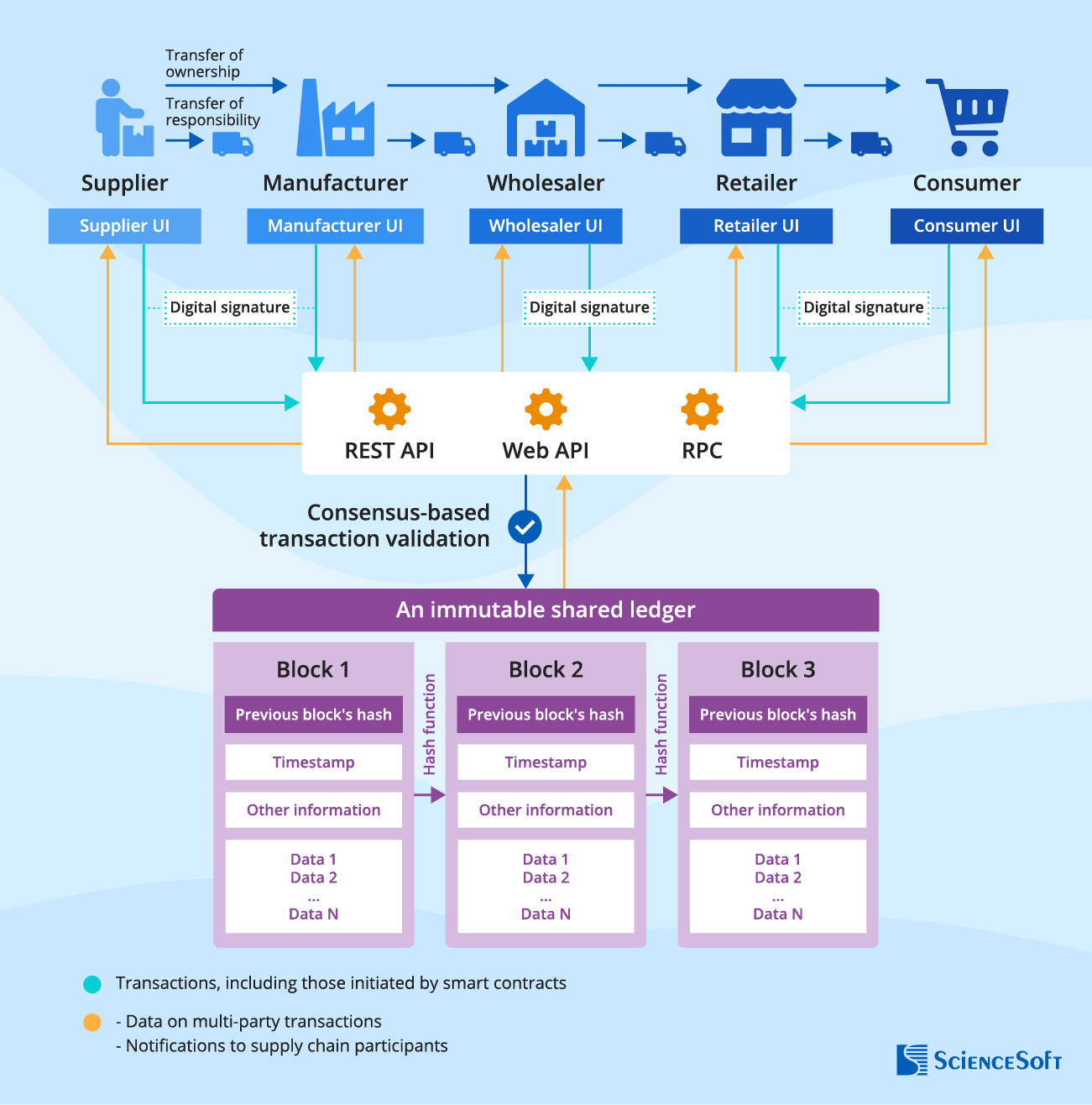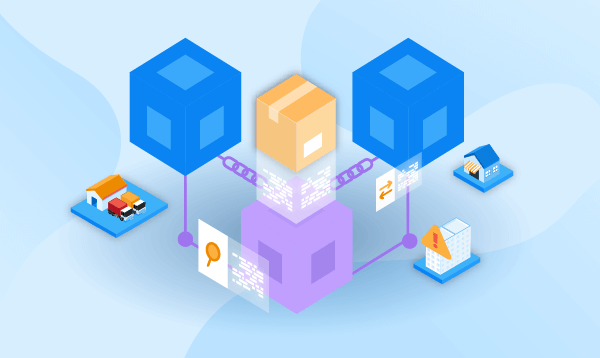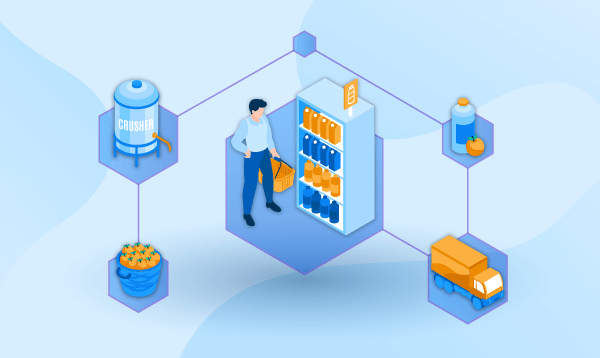Blockchain for Provenance and Traceability
ScienceSoft applies 36 years of experience in IT and proficiency in supply chain management and blockchain development to design and build robust blockchain solutions for provenance and traceability.
Blockchain for Provenance and Traceability: The Essence
Blockchain-based traceability is gaining popularity as a way to securely share asset provenance data among the supply chain parties, quickly prove goods’ authenticity and origin, streamline claim resolution, and accurately spot fraud and counterfeiting.
Blockchain for traceability and provenance provides complete visibility of asset-related data and transactions, enables product source data backtracking in seconds rather than days, and offers enhanced protection of sensitive business information.
Market Info: Blockchain Technology in Provenance and Traceability
The global blockchain market was estimated at $20.16 billion in 2024. It is forecasted to reach $393.42 billion by 2032 at a CAGR of 43.65%. Increasing demand for facilitated tracking of inventory and asset provenance and end-to-end traceability of goods-related events and transactions is the main driver for the popularity of specialized blockchain solutions across various industries, from food manufacturing and fashion retail to healthcare and real estate.
How Blockchain for Provenance and Traceability Works
Main use cases
Supply chain and logistics management
End-to-end traceability of multi-party obligations, goods shipment, and payments across multiple supply chain tiers. Assuring the supply authenticity and origin, which is critical for inventory like drugs, food products, and electronic components.
Asset management
Immutable asset records for various industries, from real estate and entertainment to luxury retail and additive manufacturing, to prove asset provenance and prevent fraud and counterfeiting.
Management of legal ownership documents
An immutable audit trail of all manipulations across legal documents that serve as proof of ownership, including document creation, editing, viewing, and sharing.
Claim management
Providing proof of goods provenance and a full history of all multi-party transactions for transparent resolution of claim disputes, e.g., on goods quality or authenticity.
Sample architecture
In the blockchain network for provenance and traceability, once validated and encrypted, data and transactions are stored in timestamped blocks linked in chronological order. The blocks form an immutable distributed ledger that serves as a database shared by multiple authorized parties and provides a single source of truth to verify the provenance of assets and inventory. Network participants interact with the distributed ledger to transact and trace data using role-specific web applications.

Key features
Traceability of multi-party transactions
A distributed ledger available to the blockchain network participants provides an immutable record and real-time view of all transactions between the involved parties.
Protocols that enable automated enforcement of fixed obligations under multi-party agreements (e.g., making payments, transfer of responsibility or ownership) upon the pre-defined events.
Automated recordkeeping
All transactions between the blockchain network participants, including those initiated by smart contracts, are automatically validated, timestamped, and recorded in the distributed ledger.
Product provenance tracking
Data on the product journey from raw material origin through shipment, processing, and quality check across different locations and responsible parties can be tracked in the blockchain by multiple parties at any point.
Consensus-based data validation
The rules for automated validation of transactions and prioritization of their processing and storage are specified by pre-defined consensus protocols, e.g., proof-of-stake (for public blockchains) or selective endorsement (for private or consortium blockchains).
Hashing
A hash value, which serves as a unique cryptographic identifier, is automatically generated for each piece of data in the blockchain network. Even a minor change in the data leads to a change in all the output hash values, which makes it tamper-evident.
Blockchain data security is achieved via multi-factor authentication, role-based controls, intelligent fraud detection, transferred data encryption, and more.
Configurable access rights
In case of private or consortium blockchain, the rights to transact, view or share data can be configured for various participants.
Blockchain Consulting and Development by ScienceSoft
Since 2020, ScienceSoft has been providing full-cycle blockchain development services to create reliable blockchain solutions for end-to-end traceability of transactions and events.
Blockchain for provenance and traceability consulting
- Analyzing your business needs and eliciting requirements for a blockchain system for provenance and traceability.
- Suggesting optimal blockchain network type, architecture design, and tech stack.
- Providing a detailed set of blockchain provenance and traceability features.
- Preparing a plan of integrations with the required software (e.g., ERP, accounting software, selling platforms).
- Blockchain security consulting.
- Delivering a roadmap for blockchain system implementation and a risk mitigation plan.
Blockchain for provenance and traceability development
- Blockchain for provenance and traceability needs analysis.
- Blockchain software conceptualization.
- Architecture design of the blockchain for provenance and traceability.
- Blockchain for provenance and traceability development.
- Integrating the blockchain system into an existing software ecosystem.
- Testing and quality assurance.
- User training.
- Blockchain software support and evolution (if required).
Technology Stack for Blockchain Implementation
The Challenges of Blockchain for Provenance and Traceability
Challenge #1: High quality of input data
Once recorded in the blockchain ledger, data becomes immutable. Low-quality input data is bound to remain stored in the blockchain, which can result in inaccurate product provenance identification or the incorrect resolution of product quality and asset ownership claims.
Check out the solution
Challenge #2: Continuous upload of supply chain data
Blockchain needs to continuously collect all available supply chain data to maintain a complete history of data on product provenance, location, and storage conditions and trace products in real time. Thus, the solution has to seamlessly integrate with all relevant software tools (including legacy ones) of multiple blockchain network participants.
Check out the solution
Complex asset operations like cross-border goods shipment or mortgaged property sales involve massive volumes of documents that legally prove asset responsibility and ownership transfers. Blockchain uses such documents to inform recorded transactions and needs to provide users with instant access to the source documentation. Storing large documents directly on the blockchain is unfeasible due to cost and privacy issues. We implement scalable cloud storage solutions like IPFS or AWS S3 to avoid ineffective on-chain storage and integrate them with the blockchain for quick and secure document sharing.
Costs of Blockchain-Based Software for Provenance and Traceability
The cost of blockchain development varies greatly depending on:
- Blockchain network type (private, public, consortium, hybrid).
- The type of consensus protocol (PoW, PoS, selective endorsement, etc.).
- The number and complexity of a solution’s functional modules, including smart contracts.
- The number and complexity of web and/or mobile applications for various user groups (e.g., suppliers, end consumers, LSPs) to interact with the blockchain solution.
- The volume of data to be migrated from spreadsheets and/or existing supply chain management software.
- The number and complexity of integrations with required software (e.g., ERP, accounting software, selling platforms).
- Application availability, performance, and security requirements.
- Blockchain interoperability capabilities.
- The required deliverable (PoC, MVP, a full-scale solution), which influences the duration of blockchain development.

From ScienceSoft’s experience, the development cost for an MVP of blockchain-based provenance and traceability software will be around $80,000–$150,000. Building a full-featured blockchain solution that comprises a private network and smart contracts requires investments of $400,000–$1,500,000+.
Want to know the cost of your blockchain solution?
Our Blockchain Insights

Blockchain for Supply Chain
ScienceSoft lists the main use cases, key features, challenges, and cost factors of blockchain for supply chain management and inventory control.

Blockchain in the Food Supply Chain
Learn the main use cases and features of blockchain in the food supply chain, implementation costs and ways to solve its major challenges.
About ScienceSoft
ScienceSoft is a global IT consulting and software development company headquartered in McKinney, Texas. Since 2020, we have been helping businesses implement blockchain for improved traceability of data and transactions. In our blockchain projects, we employ robust quality management and data security management systems supported by ISO 9001 and ISO 27001 certificates.



